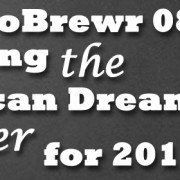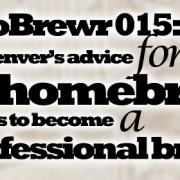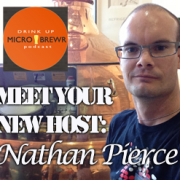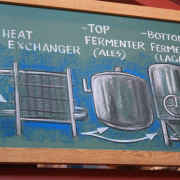MicroBrewr 023: Keep striving to be better
Podcast: Play in new window | Download | Embed
Subscribe: RSS
Patty Elliott met her husband at Armadillo Music Hall. Years later, even while running their export business, they saw an old hardware building in their town and decided it should have a brewpub in it. So they started Pecan Street Brewing in Johnson City, Texas.
While they spent 3 years renovating the building, their son, Sean, practiced brewing.
They strive to make Pecan Street Brewing a “third place.” A third place is a place other than work or home, where people can spend a large amount of time and feel just as comfortable as at the other places.
Patty has a hard time defining success. “We want to be perfect and we know we wont be there,” she says, “but we want to keep striving to be better. So I don’t know if we could say if we’ve ever succeeded because we just keep wanting to get better.”
Patty shares some fun stories about the names of their beers. She also has lots of great advice including:
- Be sure you have enough funds
- Be ready to stick with it
Listener question:
From Christopher Kirby: What’s the best beer you have ever had?
Book recommendation:
- The Great Good Place: Cafes, Coffee Shops, Bookstores, Bars, Hair Salons, and Other Hangouts at the Heart of a Community by Ray Oldenburg.
Check out the entire list of recommended books, click here.
An upcoming beer style:
India Pale Ale
Other resources:
- Texas Pecan Board.
- My continuing battle against perfectionism—part 1 of ? by Nathan Pierce, July 28, 2014.
- How India pale ale conquered the world by S.W., The Economist, May 13, 2014.
You can reach Patty Elliott and Pecan Street Brewing at:
If you like the show, please subscribe in iTunes or Stitcher. When you subscribe, it’ll let you know when there’s a new episode, you won’t miss a thing!
Support MicroBrewr
Help keep MicroBrewr on the air. CLICK HERE for ways you can help.














Nathan, I’m loving the podcast, and since you asked for feedback, here a couple of things I would like to see more of in the shows:
1. Less formulaic questions, and more natural follow-up questions. For example, “Cans or Bottles?” “Bottles” “Ok, next,…” Doesn’t work. Ask WHY they like bottles. If you don’t get to all of your questions, that’s ok, but I would rather have quality conversation than quantity of questions. Personalizing is good, and I’m glad you’re starting to do that. A good followup that I wanted to ask on this one was “What modifications or renovations did your husband do over those 3 years?” Most old buildings need extensive renovations, so I’d like to know what to look out for in opening my business.
2. Get listener questions for the specific brewery if possible. If you could publish a list here on the site and mention “Our upcoming interviews A, B, and C, so ask your questions ahead of time…”, you might get more interesting questions from the audience (and that would make your job easier).
3. More information about the business and brewery setup. Years in business, brewhouse size, barrels brewed / year, seats in the brewpub, no. of dedicated tap handles, etc. That info would be very interesting for us.
4. More general business questions- how do they do their accounting? how much capital did they have to start up? Where did they get that capital? How hard/easy was the licensing from the state? Where do they source their supplies? What local regulations did they have trouble with? Were the locals helpful in setting up the business?
I’ve been listening for a couple months, and I’m so grateful for the work you’re doing here. Please keep them coming!
Dan, THANK YOU SO MUCH for taking the time to comment! I appreciate your feedback.
A couple people have asked about some basic stats like your comment #3 above. Maybe I can ask that in the pre-interview questions then just put in the show notes. What do you think about that?
About accounting and finances, I am planning to soon interview a consultant who does accounting for breweries. I’ll incorporate some of your questions and Orlando’s too. THANKS!
Hey Dan did you hear episode 25? Erich Allen from Studio Brew talked a lot about navigating the regulations and the relationships with the regulatory agencies. I hope that was insightful for you.